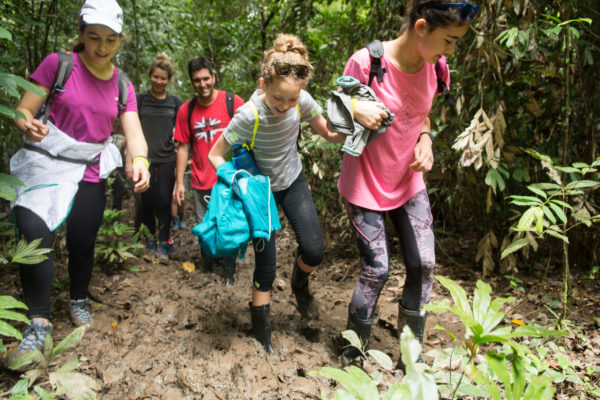Surviving Borneo! A geography and biology trip
2017-04-25
 During the Easter break the geography and biology departments took 16 pupils to Sabah in Borneo. An exciting and sometimes challenging programme lay in store for both pupils and staff, especially considering that everyone had to cope with the sucking mud and persistent bugs that the rainforest constantly threw at them.
The core aim of the trip was to give pupils the opportunity to understand the ecology of the rainforest, the threats that are causing its demise and different approaches to its management and conservation. These are critical issues that affect not just Borneo but all tropical regions globally, which means that they continue to have a profound effect on the world we inhabit.
We took an active and hands-on approach to learning in order to immerse the pupils in these issues; we saw a leopard cat cub living on the edge of a plantation, we helped to remove an invasive weed from a lake, collected saplings and planted them to restore a previously deforested area, and we met the owner of a palm oil plantation who helped us to make a judgement about how sustainable palm oil plantations in Sabah really are. Of course, we also saw orangutans, visited the incredible Gomantong Caves that are home to literally millions of cockroaches as well as the nests used to make bird’s nest soup. For our final morning, we took things a little easier, enjoying beach life on the beautiful island of Sapi.
The pupils were asked to write about and reflect on their experiences during the trip; the short excerpts that follow demonstrate how valuable this visit to Borneo was to them, both in terms of making unforgettable memories but also informing their perspective on global sustainability.
Mr Corke
Head of Geography
Stephanie (Year 10): The Borneo trip was an informative and interesting adventure. Led by our guides, Jeff and Fikri, we cruised down the Kinabatangan River where we caught sight of huge numbers of birds such as hornbills, and other smaller ones in great numbers; watching from far away, they looked like a swarm of bees. We even saw an eagle flying from far away.
Aidan (Year 9): The second day of our trip involved hiking through the rainforest where we learned about its ecology. Unfortunately, hiking through the rainforest is not as pleasant as it might initially sound. Mosquito bites were extremely frequent, and leeches were present as well. Three kilometres seemed much longer than we originally thought, as we weaved through the vegetation and trudged through the mud in the humid tropical air. The hiking trail was in a slight basin, meaning that flood water didn’t drain away as quickly as elsewhere. Unluckily for us, this meant that the mud was extremely unstable and many people temporarily lost their boots! Mr Corke later classified this as “Type Two Fun”; fun which isn’t fun at the time, but will provide life-long memories and stories.
Damian (Year 10): Trudging through the dank, humid rainforest makes you really appreciate the A/C! Upon arriving at our destination, the guide, Jeff, unloaded his goods, including some impressive machetes. The purpose of the machetes was to chop down vines which were a threat to the recovering area of rainforest. These grow up and around the trees that are trying to grow, and literally pull them down. This makes it much harder and slower for the rainforest to recover from a deforested state. After a thorough safety briefing we got to work. Not only did we do our bit to help the rainforest recover but it was also great fun. Living in the rainforest isn't exactly the Hilton and so some of us really needed this release of energy.
Angela (Year 9): Palm oil is hugely beneficial and is used a lot in products such as shampoo, lipstick and a wide variety of foodstuffs. It can last for 30 years after being planted and the amount of energy and chemicals required to sustain a palm oil plantation (including fertilizer and pesticides) is less compared to soybean and rapeseed plantations. However, using land for this purpose means that the forest will be burned or cut-down to make space. Deforestation not only causes climate change and global warming, it also destroys the natural habitat for plants and animals, which might possibly lead to their extinction. When it rains, eutrophication might happen, which is very harmful to a river-based ecology. This can be managed by creating buffer zones between plantations and water bodies. In my opinion, I don't really like palm oil plantations, although they are commonly used around the world, and I think it would help if we reduce the amount of palm oil we use in our daily lives, despite its beneficial uses.
Roni (Year 9) and Victoria (Year 10): During our time in Borneo, we helped to replant an area that had previously been an illegal palm oil planation encroachment into the rainforest. To do this, we first collected saplings from the rainforest and brought them to the tree nursery (in the torrential rain!), where they can grow and be planted when the saplings are potted and ready. Forest restoration through planting trees is essential to help increase the size of the canopy. This is crucial for the rainforest because without the canopy layer, there will be less oxygen and a loss of habitats, which threatens the animals and plants that live in different layers of the forest. By planting more trees, we can increase the biodiversity in that area and provide more shelter for the animals. Although we left soaking wet, overall we had an amazing experience in Borneo!
Jason (Year 10): Our task was to create new life in an area that was once covered with illegally planted palm trees. Using our 'parang' (machete) we got to work clearing the area. While cutting down weeds, we suddenly found that we had encountered a baby leopard cat purring in its den. Working quickly, so as to not disturb the leopard, we began planting the small saplings. As we planted each one, we knew the fully grown tree would be able to support more wildlife. In total, we planted 120 trees and in a few short years they will provide a protective canopy layer while also adding to the Earth’s oxygen supply.
Serena (Year 9), Amelia (Year 9) and Francesca (Year 9): On the 6th day of our trip, we went to visit the orang-utan sanctuary in Sepilok. It was an amazing experience because we got to see the rescued orang-utans, both adults and babies, which really made our day. After the educational and very cute trip to the orang-utan sanctuary, we went to experience the rainforest canopy walk. Here, we even saw an orang-utan up close and in the wild! It was amazing and a first for all of us!
All in all, it was an incredible trip in which we did our little bit for the environment. More importantly though, bringing an environmental awareness of global issues to our pupils can result in meaningful long-term actions that go beyond our relatively small-scale efforts in Borneo, especially when their knowledge is passed on to friends and family. There are some simple steps you can take to reduce your environmental footprint. These include:
1. Calculate your carbon footprint. How do you compare to the global average of 4 metric tons of carbon emissions per person? How can you reduce your CO2 emissions? Work out your carbon footprint here: https://www.theguardian.com/environment/interactive/2009/oct/20/guardian-quick-carbon-calculator
2. It is very difficult not to use products that have palm oil in them, but we can try to buy sustainably sourced palm oil. See more information here: http://palmoilscorecard.panda.org/
3. Eat less beef. Cattle ranching is the major driver of deforestation in Latin America with estimates suggesting that it accounts for 80% of all the region’s deforestation. By eating less beef, the demand is reduced and thus rates of deforestation slow. Plus, chicken tastes good too!
Matt Corke
Head of Geography
During the Easter break the geography and biology departments took 16 pupils to Sabah in Borneo. An exciting and sometimes challenging programme lay in store for both pupils and staff, especially considering that everyone had to cope with the sucking mud and persistent bugs that the rainforest constantly threw at them.
The core aim of the trip was to give pupils the opportunity to understand the ecology of the rainforest, the threats that are causing its demise and different approaches to its management and conservation. These are critical issues that affect not just Borneo but all tropical regions globally, which means that they continue to have a profound effect on the world we inhabit.
We took an active and hands-on approach to learning in order to immerse the pupils in these issues; we saw a leopard cat cub living on the edge of a plantation, we helped to remove an invasive weed from a lake, collected saplings and planted them to restore a previously deforested area, and we met the owner of a palm oil plantation who helped us to make a judgement about how sustainable palm oil plantations in Sabah really are. Of course, we also saw orangutans, visited the incredible Gomantong Caves that are home to literally millions of cockroaches as well as the nests used to make bird’s nest soup. For our final morning, we took things a little easier, enjoying beach life on the beautiful island of Sapi.
The pupils were asked to write about and reflect on their experiences during the trip; the short excerpts that follow demonstrate how valuable this visit to Borneo was to them, both in terms of making unforgettable memories but also informing their perspective on global sustainability.
Mr Corke
Head of Geography
Stephanie (Year 10): The Borneo trip was an informative and interesting adventure. Led by our guides, Jeff and Fikri, we cruised down the Kinabatangan River where we caught sight of huge numbers of birds such as hornbills, and other smaller ones in great numbers; watching from far away, they looked like a swarm of bees. We even saw an eagle flying from far away.
Aidan (Year 9): The second day of our trip involved hiking through the rainforest where we learned about its ecology. Unfortunately, hiking through the rainforest is not as pleasant as it might initially sound. Mosquito bites were extremely frequent, and leeches were present as well. Three kilometres seemed much longer than we originally thought, as we weaved through the vegetation and trudged through the mud in the humid tropical air. The hiking trail was in a slight basin, meaning that flood water didn’t drain away as quickly as elsewhere. Unluckily for us, this meant that the mud was extremely unstable and many people temporarily lost their boots! Mr Corke later classified this as “Type Two Fun”; fun which isn’t fun at the time, but will provide life-long memories and stories.
Damian (Year 10): Trudging through the dank, humid rainforest makes you really appreciate the A/C! Upon arriving at our destination, the guide, Jeff, unloaded his goods, including some impressive machetes. The purpose of the machetes was to chop down vines which were a threat to the recovering area of rainforest. These grow up and around the trees that are trying to grow, and literally pull them down. This makes it much harder and slower for the rainforest to recover from a deforested state. After a thorough safety briefing we got to work. Not only did we do our bit to help the rainforest recover but it was also great fun. Living in the rainforest isn't exactly the Hilton and so some of us really needed this release of energy.
Angela (Year 9): Palm oil is hugely beneficial and is used a lot in products such as shampoo, lipstick and a wide variety of foodstuffs. It can last for 30 years after being planted and the amount of energy and chemicals required to sustain a palm oil plantation (including fertilizer and pesticides) is less compared to soybean and rapeseed plantations. However, using land for this purpose means that the forest will be burned or cut-down to make space. Deforestation not only causes climate change and global warming, it also destroys the natural habitat for plants and animals, which might possibly lead to their extinction. When it rains, eutrophication might happen, which is very harmful to a river-based ecology. This can be managed by creating buffer zones between plantations and water bodies. In my opinion, I don't really like palm oil plantations, although they are commonly used around the world, and I think it would help if we reduce the amount of palm oil we use in our daily lives, despite its beneficial uses.
Roni (Year 9) and Victoria (Year 10): During our time in Borneo, we helped to replant an area that had previously been an illegal palm oil planation encroachment into the rainforest. To do this, we first collected saplings from the rainforest and brought them to the tree nursery (in the torrential rain!), where they can grow and be planted when the saplings are potted and ready. Forest restoration through planting trees is essential to help increase the size of the canopy. This is crucial for the rainforest because without the canopy layer, there will be less oxygen and a loss of habitats, which threatens the animals and plants that live in different layers of the forest. By planting more trees, we can increase the biodiversity in that area and provide more shelter for the animals. Although we left soaking wet, overall we had an amazing experience in Borneo!
Jason (Year 10): Our task was to create new life in an area that was once covered with illegally planted palm trees. Using our 'parang' (machete) we got to work clearing the area. While cutting down weeds, we suddenly found that we had encountered a baby leopard cat purring in its den. Working quickly, so as to not disturb the leopard, we began planting the small saplings. As we planted each one, we knew the fully grown tree would be able to support more wildlife. In total, we planted 120 trees and in a few short years they will provide a protective canopy layer while also adding to the Earth’s oxygen supply.
Serena (Year 9), Amelia (Year 9) and Francesca (Year 9): On the 6th day of our trip, we went to visit the orang-utan sanctuary in Sepilok. It was an amazing experience because we got to see the rescued orang-utans, both adults and babies, which really made our day. After the educational and very cute trip to the orang-utan sanctuary, we went to experience the rainforest canopy walk. Here, we even saw an orang-utan up close and in the wild! It was amazing and a first for all of us!
All in all, it was an incredible trip in which we did our little bit for the environment. More importantly though, bringing an environmental awareness of global issues to our pupils can result in meaningful long-term actions that go beyond our relatively small-scale efforts in Borneo, especially when their knowledge is passed on to friends and family. There are some simple steps you can take to reduce your environmental footprint. These include:
1. Calculate your carbon footprint. How do you compare to the global average of 4 metric tons of carbon emissions per person? How can you reduce your CO2 emissions? Work out your carbon footprint here: https://www.theguardian.com/environment/interactive/2009/oct/20/guardian-quick-carbon-calculator
2. It is very difficult not to use products that have palm oil in them, but we can try to buy sustainably sourced palm oil. See more information here: http://palmoilscorecard.panda.org/
3. Eat less beef. Cattle ranching is the major driver of deforestation in Latin America with estimates suggesting that it accounts for 80% of all the region’s deforestation. By eating less beef, the demand is reduced and thus rates of deforestation slow. Plus, chicken tastes good too!
Matt Corke
Head of Geography 相关资讯

What is iGEM and our project, Barnacure?2025-10-09
iGEM Competition & Barnacure Team Members Team Illustration by Joanna, Year 11Article written Jing Jing, Year 11Primary Principal Investigator: Thomas Edwards, Head of Biology & Head of Science What
点击阅读

上海惠灵顿携手Oogie Art,助力艺术学子圆梦名校2025-11-04
上周,我校成功举办“走向名校:视觉艺术梦想之路”活动,并正式宣布上海惠灵顿与Oogie Art达成全新合作。今后,计划在大学攻读视觉艺术专业的惠灵顿学生,将有机会获得来自全球顶尖作品集指导机构Oogie Art的专业建议。 惠灵顿艺术总监Michael Larsen-Disney表示:“惠灵顿拥有从幼儿园到IB文凭阶段完整的视觉艺术课程体系,自一年级起就有专业艺术教师全程授课。通过艺术部门的努力
点击阅读

立即报名惠灵顿2025 年Summer Festival: 超级英雄集结!2025-04-22
一年一度的Summer Festival即将于5月10日盛大开启!作为惠灵顿引以为傲的传统活动,这一天不仅是校园的欢乐盛会,更是我们凝聚社区精神、共庆校园文化的重要时刻。今年,我们以“超级英雄”为主题,诚邀每一位成员以创意装扮亮相,共同打造一场充满活力与热情的庆典。 不要错过!扫描海报上的二维码进行购票 欢乐嘉年华特别放送 想清凉一夏就来海王戏水乐园打水仗,爱热闹的一定要锁定正义联盟大舞台的精彩
点击阅读










